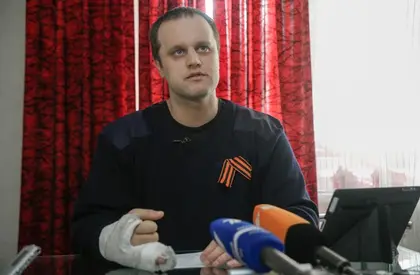He spoke and got arrested less than an hour later, according to local prosecutors.
A 30-year-old Donetsk resident, Pavel Gubarev says he has three degrees in history, law and state management. When getting the last one, he says, he thought of a government career, but changed his plans to work in advertisement business.
JOIN US ON TELEGRAM
Follow our coverage of the war on the @Kyivpost_official.
His main message as a self-proclaimed governor was: referendum on the territorial status of Donetsk Oblast and non-recognition of Kyiv authorities and the central government’s appointed governor, oligarch Serhiy Taruta.
Gubarev also said that he contacted pro-Kremlin Crimean officials and even Russian Duma deputies. “I don’t rule out that Russian military forces can come in to settle the tension, this is the only way I see to keep it without blood,” he said.
Gubarev planned to gather 100,000 people for a rally over the weekend that aimed to elect a people’s committee, kind of a temporary government in Donetsk Oblast.
He first appeared at the scene of Donetsk’s pro-Russian protests on Feb. 27, but says he made a decision to get involved a couple of days earlier.
“This happened on Feb. 25, after monitoring the forces of this movement. I understood there are no leaders at all, half of them are bought and the others just weren’t ready to take charge,” he explained. What he did is a brave and risky step, “but I wasn’t thinking I was just acting,” Gubarev said.
He said he doesn’t give up easily.
“I was threatened with guns and offered money, but when they realized I cannot be bought and am not afraid, they fabricated a criminal case against me,” he said.
Gubarev claimed he had to evacuate his family: a wife and three small children, to keep them safe.
“I am sure that even more people will gather if I am arrested and there will be people who would keep the movement alive and strong,” he said.
According to Gubarevm there are people with arms in the people’s militia that he head. “I have never called for arms, but I know some people have them and I am not in control of each and every person in the movement, people are angry,” he said.
Gubarev’s lawyer, Olena Pryadko, says the law he is suspected of breaking as a pro-Russian protest leader carries with it the possiblity of three years in prison as a maximum punishment and that he is presumed guilty before a court rules. “So if he is finally arrested this is politically motivated,” she stressed.
“Lena, Lena,” a nervous Gubarev said, calling on his lawyer to stop talking to journalists.
“What if they come now, what if I get arrested right now should I run away? Where can I run away,” he asked anxiously, Pryadko promised consultations when the press is gone, but apparently there wasn’t enough time.
The March 6 arrest of Donetsk Oblast’s pro-Kremlin, self-proclaimed governor Pavel Gubarev.
The Security Service of Ukraine also reported his arrest today, Interfax-Ukraine said. “Employees of the Security Service of Ukraine (SBU), with the assistance of Alpha [special police], have detained Gubarev in his apartment in Donetsk under a court ruling,” the SBU’s press center told the news service..
According to the SBU, Gubarev was charged with committing crimes under Part 2, Article 110 (encroachment on the territorial integrity and inviolability of Ukraine), Part 1, Article 109 (actions aimed at the forcible change or overthrow of the constitutional order, or the seizure of state power) and Article 341 (seizure of state or public buildings or structures) of the Criminal Code of Ukraine.
Pro-Russian protesters seized several times the building of Donetsk Regional State Administration under the leadership of Gubarev.
During one of the seizures Gubarev put forward a number of demands to the local authorities, including the holding of a referendum on the status of the region. These actions are considered as an unconstitutional grab of state power.
Kyiv Post staff writer Daryna Shevchenko can be reached at shevchenko@kyivpost.com
Editor’s Note: This article has been produced with support from the project www.mymedia.org.ua, financially supported by the Ministry of Foreign Affairs of Denmark, and implemented by a joint venture between NIRAS and BBC Media Action.The content in this article may not necessarily reflect the views of the Danish government, NIRAS and BBC Action Media.
You can also highlight the text and press Ctrl + Enter




